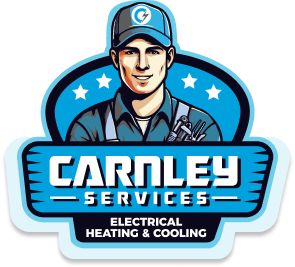If you live in a place like Florida, the sticky air might seem like a minor discomfort. Unfortunately, it can also cause problems with your electrical systems. Humidity and electricity do not mix. In these regions, electrical problems tend to pop up. Here are some of the most common reasons electrical systems fail in humid climates and what you can do to prevent major headaches in your home.
Moisture Leads to Corrosion in Your Electric Components
Humidity is moisture in the air. Unfortunately, it loves to sneak everywhere. Over time, moisture finds its way into electrical outlets, junction boxes, light fixtures, and behind your walls. Once it gets in, corrosion follows.
Corroded wires can stop conducting electricity, overheat, and spark fires. Plus, the insulation around wires can start to break down. That can expose conductors and cause a short or shock. If you live near the ocean, the salty air makes this worse. Saltwater is highly conductive. Mixing it with humid air speeds up corrosion, especially in outdoor or poorly sealed electrical systems.
Humidity Breaks Down Insulation
Electrical wires are insulated to keep the current contained and safe. However, it is not designed to stand up to mold and high moisture levels for a long time. In Florida homes, you might find electrical wiring running through damp attics. If insulation gets wet and moldy, it loses its protective abilities. Plus, if pests like rats or squirrels get involved, they can chew right through the insulation. This can expose live wires. When this happens, your home can face a serious risk of electric shock or fire.
Some Fixtures Are Not Made for Humid Environments
In humid areas, you have to be careful about choosing the right electrical components. For these homes, you will want to use weather-rated outlets, switches, enclosures, and fixtures in bathrooms, kitchens, garages, and pool areas. Some of these components may not be rated for moisture if your home is older. That could be a problem. Upgrading to GFCI (ground fault circuit interrupter) outlets and using sealed, weatherproof boxes is one of the easiest ways to keep moisture out and prevent dangerous failures.
Condensation Causes Appliance Problems
Humidity can cause problems inside your appliances. Air conditioners, refrigerators, washing machines, and ceiling fans have internal electrical components. These spots are susceptible to condensation. Once that moisture builds up, circuit boards, motors, and contacts can become damaged. In turn, you might notice your appliances turning on and off randomly. Sometimes, that can cause tripped breakers or a complete failure of your system. HVAC systems are also vulnerable to moisture, especially if the air handler is in a garage or attic.
For those who have invested in smart thermostats, lighting systems, or home security cameras, you probably love the convenience they offer. But in humid places like Florida, these sensitive devices can be finicky and cause glitches at the worst times. Moisture in the air can interfere with the electrical signals that power and control them. Even a little moisture can throw off signals or cause small shorts. If you want to help protect your smart devices, be sure they’re installed in well-ventilated areas and sealed properly.
Electricity and Floodwaters Are a Dangerous Mix
In Florida, heavy rains and hurricanes can bring unexpected flooding in the humid months. When water meets electricity, the results can be deadly. Even a few inches of floodwater in your home or garage can create a serious hazard if it reaches outlets, extension cords, or your electrical panel. Water conducts electricity. That means stepping into a flooded area could lead to an electric shock or electrocution.
After floodwaters recede, moisture can linger inside walls, around wiring, and in your outlets. That hidden dampness can create long-term safety issues if not properly addressed. If your home has been affected by flooding, have your electrical system inspected by a licensed electrician before turning the power back on.
Storms and Lightning Add Another Layer of Risk
Florida is famous for its afternoon thunderstorms and frequent lightning strikes. While this is not directly caused by humidity, it makes your electrical system vulnerable to surges. This can be made worse by the presence of moisture.
When lightning strikes nearby or a surge comes through the grid, those compromised systems are more likely to suffer damage. That could mean fried electronics, melted wires, or complete panel failure. Installing whole-house surge protection and using proper grounding is important in this region. Unfortunately, many homes still do not have this added layer of defense. If you have an older home, you may have ungrounded outlets. You can recognize these outlets due to the lack of a third hole for the grounding post.
Regular Electrical Inspections Are Important in Humid Areas
In humid places like Florida, your home’s electrical system is under constant pressure. You might not see it, but behind your walls, moisture is slowly working its way into wires, outlets, and panels.
One of the smartest things you can do is to schedule a regular electrical inspection. A professional electrician will do more than make sure the lights turn on. During a home inspection, they look for all the hidden problems that can cause bigger issues down the line.
This can include:
- Early signs of rust
- Breakers that are wearing out or panels that are overworked
- Moisture-damaged outlets and fixtures
- Hot light switches or electrical outlet plates
- Old, outdated, or unsafe wiring
In a dry, mild climate, you might be able to put off electrical inspections for a few years. However, between the tropical storms, salty air, and high humidity, things wear out faster in Florida. You will want to have your system inspected once a year. A short appointment could catch a small issue before it turns into a costly repair or even a house fire.
When to Call a Professional Electrician
If your lights are flickering without explanation, your breakers are tripping, or you notice a strange burning or “fishy” smell near outlets or your breaker panel, you need to take action. These are all signs that moisture or wear may be compromising your system.
Even if everything seems to be functioning, rust around your panel or discoloration on faceplates are early red flags. These are warning signs. While it might be tempting to troubleshoot on your own, electrical issues in a humid environment can escalate. That is why you need a licensed electrician. They have the tools and training to diagnose and fix the problem before it becomes more serious.
At Carnley Services, we are a locally trusted electrical company serving the Pensacola area. Our team lives by a simple promise: customers come first. We know what it takes to protect your electricity from the challenges of heat, humidity, and storms.
Whether we’re troubleshooting a moisture-damaged outlet or making sure your system is ready for another Gulf Coast summer, our team brings the same level of care and professionalism to every job. We’ll ensure you electrical panel is safe and efficient. Contact us today to schedule an in-home appointment with our trained and licensed electricians.








